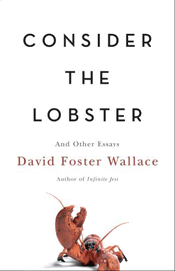BOOKS: 'Consider the Lobster And Other Essays'
 Want to feel dumb? David Foster Wallace's brainy, sprawling and funny essays will leave you worrying you didn't read the dictionary enough as a child. His latest, "Consider The Lobster And Other Essays," is a rollicking ride through Wallace-world, where essays balloon out with footnotes[1], flow charts and interjections into free-wheeling performance art. It's brain food that tastes good.
Want to feel dumb? David Foster Wallace's brainy, sprawling and funny essays will leave you worrying you didn't read the dictionary enough as a child. His latest, "Consider The Lobster And Other Essays," is a rollicking ride through Wallace-world, where essays balloon out with footnotes[1], flow charts and interjections into free-wheeling performance art. It's brain food that tastes good.Wallace is also known for his fiction, including the hefty novel "Infinite Jest," but I find his style works best for me in nonfiction. This collection and the earlier "A Supposedly Fun Thing I'll Never Do Again" are microscopically detailed examinations of life as we know it. What's appealing about Wallace's essays is how he turns simple subjects – lobster festivals, John McCain, pornography, dictionaries — into thoughtful epics.
 "Consider the Lobster" collects the best of Wallace's nonfiction from the last decade or so. Highlights include "Big Red Son," where Wallace attends raunchy adult video industry awards, and "Up Simba," where he tags along with John McCain's doomed presidential campaign in 2000. Wallace's prose ripples with a lusty adoration of sheer wordpower, and that enthusiasm helps make some of his indulgences palatable. Ten-dollar words like synecdoche, anapest and prolegomenous are peppered in, but Wallace still strives to keep his prose non-academic and straightforward in its conclusions.
"Consider the Lobster" collects the best of Wallace's nonfiction from the last decade or so. Highlights include "Big Red Son," where Wallace attends raunchy adult video industry awards, and "Up Simba," where he tags along with John McCain's doomed presidential campaign in 2000. Wallace's prose ripples with a lusty adoration of sheer wordpower, and that enthusiasm helps make some of his indulgences palatable. Ten-dollar words like synecdoche, anapest and prolegomenous are peppered in, but Wallace still strives to keep his prose non-academic and straightforward in its conclusions. His fluid words can dance, describing the Adult Video News awards ceremony as "a kaleidoscopic flux of stilted acceptances and blue one-liners and epileptic strobes and spotlights following winners serpentine and high five-studded paths to the stage." But they can also bite in short form, like a spot-on line describing a frightened elderly lady as "poor tendony Mrs. R."
What puts some people off of Wallace is that it can look like he's showing off. The man writes novels with footnotes, sometimes with footnotes to those footnotes, and that can scream of "ain't I smart?" His works sprawl, without borders (of the 10 pieces in "Consider the Lobster," several are over 50 pages long). Yet it's an honest outgrowth of the man's polyphonic interest in any- and everything. His enthusiasm is contagious.
Sometimes it does get a bit much — the essay "Host" has some fine insight into a conservative radio host's career and the appeal of such demagoguery, but the piece is dotted with countless boxed asides and interjections. If you get into the rhythm of it all, it flows, but honestly, how many readers will be willing to make that leap? The piece "Authority and American Usage" is a lengthy debate on ideological factions in American lexicograpy, or, in other words, the arguments between people who make dictionaries. It's interesting, yet may be hard for some readers to get into. On the other hand, essays on John Updike and Dostoyevsky are sharp, bracing book criticism.
Wallace is best when his literary gymnastics pay off with golden insights. Take "Consider The Lobster," a piece from Gourmet magazine that starts off as a carefree dissection of a Maine lobster festival, but then slowly turns into a musing on the morality of boiling lobsters alive. Or my personal favorite of the collection, "The View From Mrs. Thompson's," Wallace's memory of his neighborhood's experiences on 9/11. It strikes a shellshocked, often morbidly funny note that stands out from the ocean of similar essays.
"Consider The Lobster" and Wallace's highly distinctive voice makes you think, laugh and strain the brain in all the good ways.
[1]
I considered doing footnotes for this review, but then realized that'd be a bit too much.

No comments:
Post a Comment